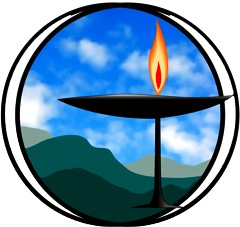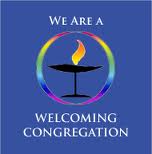Presenters
Index Page
Barker, Geraldine
Bodner, Mark
Burton, Laura
Castleberry, Kasey
Davis, Sam
Davis, Terry UU minister
Frost, Edward UU minister
Kibler, Myra
Nicholson & Brown
Sally Pamplin
Robison, Gerald
Seidman, Karl
Sheber, Larry
Sherod, Bob
Simmons, Antoine
Tremblay, Alexandra Immunologist
Waddell, Donna
Walker, James
West, Herb & Myrna
Woehr, Terry
Wood, Bruce
Other Sources
Epiphanies
by Rev. Dr. Edward Frost
Presented 2011 December 11 to the congregation of Mountain Light Unitarian Universalist Church in Cherry Log GA.
While on sabbatical in England some years ago my family and I visited the southwestern seaside town of Minehead, one of those summer resort spots where, when I was a child, my parents and I spent our holidays. It's a dramatic setting – a gently-curving beach, marked, at one end, by a steep hill which, in England, serves well enough for a mountain. We were there in winter-time. The beach was deserted. Braving the damp and chilly wind, we walked the sands alone, collecting shells, watching the ships heading in and out to the Bristol Channel.
As my wife and daughter became absorbed in examining the gifts from the sea I found myself walking alone, at ease, my brain resting, it seemed, for the first time in a long time. Suddenly, everything changed. The empty beach became now covered with ugly coils of barbed wire The expanse of sand now dotted with immense concrete pyramids set to discourage enemy landing craft. Before me knelt a brown-haired little boy working in the sand with shovel and pail, digging a moat to hold off from his castle the most persistent of Norman – or Nazi – invaders. The boy stopped his work, looked up at me, stared for a moment, then smiled in recognition. The child father to the man. "Time past and time future," T. S. Eliot wrote, "are both contained in time present." The past and the future met. The decades folded in on each other. Promises were exchanged. The adult was promised remembrance, the child was promised future: possibility.
Each took his place in the cycle of time. It was but a moment, but a moment of profound and perfect integrity. One could ask, understandably, if the experience was "real"as if explanation would make any difference. It was moment of epiphany, defined as an unwilled, unexpected appearance. In James Joyce's early uncompleted novel "Stephen Hero, "The character Stephen Daedelus defines Joyce's concept of the epiphany. It is, Daedelus says, "A sudden spiritual manifestation, whether in the vulgarity of speech or of gesture, or in a memorable phase of the mind itself." It is, he said," The most delicate and evanescent(the most fleeting) of moments."
While he was an adolescent at University College in Dublin, Joyce collected over seventy accounts of epiphanies – sudden "appearances," flashes of intuition, "visions." Fifty of them appear in his book "Stephen Hero" and in "Portrait of the Artist As A Young Man." The epiphany might be described as a "revelation." It shows us something. It demonstrates something to us in a way that perhaps no other way could. And in its offering of previously-hidden truth it sometimes presents us with the opportunity for transformation – as with Moses before the burning bush. That epiphany on the seashore at Minehead showed me the continuity of my existence. It showed me the integrity, the wholeness I had, in part, returned to England to find.
It might be that, for many complicated reasons of personality and temperament, the epiphany is experienced most often by the artist – perhaps because the artist expects to experience it. John Updike said that his stories often came to him "as a packet of material to be delivered." In Peter Shaffer's play Amadeus, the anguished Salieri studies some of Mozart's manuscripts, manuscripts that seemed like clean copies. But he soon realizes that they are not copies, but first, and only, drafts. He says, "What was evident was that Mozart was simply transcribing music completely finished in his head. And finished as most music is never finished." Joyce Carol Oates, writing of epiphanies, says that the epiphany is not the appearance of gods from the cosmos but is, she writes, "the evocation of an already existing but undefined interior state."
Again, part of my mission in spending that sabbatical in England had been to recover and test some left-behind part of myself. The appearance of that child affirmed and confirmed what was already in me. His appearance brought all the various versions of "me" into some kind of reasonable wholeness – an identity which was already there, perhaps, needing only to be evoked, to be brought before "me." Obviously, I knew in those moments – fragile and fleeting – that I was not being confronted by a ghost. I had returned to this scene after having been away for almost fifty years. Obviously I was remembering, retracing steps in the sand. I knew on some level that what I was experiencing was something, not alien, but something evoked of my own. If I hadn't known that on some level, I probably would have run screaming down the beach.
"Evocation" means the "calling out" or "calling up."What does the evoking? What calls up the epiphany? "Something," Oates says, "insists on speaking through us." What is that something? What is the source of those precious appearances, the visions, intuitions, revelations? The epiphany, I believe, is evoked, called from us not by something outside ourselves, not alien, not wholly other, but by that within us that does not love the wall we have erected between the aspects of ourselves – body separated from mind, mind from spirit, and would have it down and have us whole.
Unfortunately, that which calls the message out from with us is something which we, in western culture, have been trained to deeply distrust. The epiphany would come from that part of us that is spontaneous as opposed to the rational, deliberative, and analytical way of being we are taught to honor and value most highly. We have the tendency – particularly in western culture and perhaps particularly in our sometimes overly-rational Unitarian Universalist religion, to over-emphasize the analytical, deliberative mind, and to suppress that more "spontaneous," more receptive part of ourselves. That may be why we do not experience more epiphanies, why we do not hear many voices, see many visions. Emerson said, "One will meet no gods who harbors none." "The soul's health," Emerson said, "consists in the fulness of its reception." That is, it is important to allow ourselves to receive, not only from the world of prosaic fact, but also from the world of wonder and intuition. This receptivity, this openness to many forms and sources of knowing makes possible the calling out, the evoking of the epiphany, the sudden appearance and revelation of what lies within us, insisting on speaking through us. But that degree of openness and receptivity to what might teach us and guide us is very difficult for most of us.
I know that, though I work hard at the discipline of meditation, I have, at best, an essentially unproductive sense of "ought" about being receptive, meditative, quiet. I tell myself that I "ought" to sit quietly and let be what will be, let come what will come. But I'm not good at it. Within a few minutes of stillness another "ought" takes over I "ought" to be doing something – something "productive." I suppose it is part of the protestant ethic, the parental/schoolteacher voice saying, "Don't you have anything to do?"
That time in England was my first sabbatical. I wanted to use it wisely and efficiently. I had several academic productive, sensible plans. I was going to study this, that, and the other thing and return to my work at home filled with new wisdom and purpose. As it turned out, the most important thing I accomplished – after a couple of months of struggle with my "oughts" – was allowing myself to be still and receive. It was only then that that seaside epiphany came to me. Having allowed that to be, others could follow – and eventually did.
The poet Robert Bly – long before he became a guru of the men's movement – translated forty-four of the poems of the 15th century poet, Kabir. In Bly's version of Kabir's tenth poem Kabir writes, "Between the conscious and the unconscious, the mind has put up a swing." Ideally, we would swing freely, as our ancestors did, between the conscious and unconscious realms of our being. The problem is that most of us don't use the swing but are frozen at the conscious, analytical place, suppressing the spontaneous, the open and receptive. Carl Jung taught that our task in growing to human maturity is to seek a place to be in which we can live comfortably between the two realms, moving between conscious and unconscious, between rational and experiential.
To attempt to live only on one side or another is to live with the danger of the other side breaking through and our being unprepared to deal with it. The compulsively active person fears the quiet and the stillness. The passive person fears the call to reach out beyond the familiar, if lonely comfort of the closely controlled and protected self. There was a time when people were quite comfortable with epiphanies, with the voices they heard and the visions they saw. But what would you do if you were hiking up a mountain and suddenly a bush beside you burst into flame and a voice from within it spoke to you? Moses, according to the story, just stood there respectfully and obediently and listened to the voice.
Unlike our forebears, we not only distrust the epiphany, the voice and vision, that which comes from the spontaneous part of our selves, we fear it. Freudian psychology – or, at least,the popular understanding of Freudian psychology – has led us to dread the unconscious as the repository of a seething mass of destructive impulses and ideas pressing always at the limits of our consciousness, threatening to burst forth and do us in. It's a pity that our western culture became more enamored of Freud and his Jack The Ripper unconscious than of Jung with his view of the unconscious as the powerful source of creativity and of our spiritual nature.
To be open to the epiphanies which might lead us and guide us to more fulness of being, we must learn to trust the wholeness of our selves – to trust our intuition, our sense, our feeling at least as much as we trust our careful reason and analysis. Too often our intuition, the voice heard, the vision seen, the dream, is rejected out of hand – as Scrooge rejected his ghostly visitor as the product of "an undigested bit of beef."
Knowledge does not always begin with reason. Emerson said, "You have first an instinct, then an opinion, then a knowledge… trust the instinct to the end, though you can render no reason..by trusting it to the end, it shall ripen into truth and you shall know why you believe." "As in any fairy tale or legend," Joyce Carol Oates writes, "the magic key unlocks a door to a mysterious room – but do we dare enter?" Our forebears lived in many inner and outer rooms of being. They passed freely and frequently between one room and another, between one mode of being and another, between the rational and the intuitive, the manipulative and the spontaneous, the conscious and the unconscious. But now, within many of us, doors are closed, locked, rusted latches, cobweb-covered. What lies beyond the doors is mostly forgotten or conjured up as something to be at best scorned and at worst feared. We habitually live out of fragments of our selves, partial, discordant, incomplete. A healthy religious attitude is one of trust in the wholeness of existence and experience and in the wholeness and goodness of self, a willingness to enter all the rooms of our being.
"Compose yourself." There's an interesting phrase. It might mean"Become the composer, the creator, of your self." "Put yourself together."Take the fragments – the bits from here and there,the random notes and chords of your life and put them together into a wholeness. For many aboriginal young people the way into adulthood was through the vision quest – the deliberate seeking of the epiphany, the appearance of the informing, challenging vision. The young woman or man went to the mountain, the desert or forest to sit, without food or water, and await the appearance of that which would reveal to them their gifts. Some saw the great eagle, who showed them their gift for seeing far, for prophecy and knowing the future; others were visited by buffalo who gave them wisdom; some were carried about by the wind, others made shamans by Coyote.
We, too, have gifts – strengths, abilities, understandings, possibilities, directions – which lie within us unacknowledged and unused because they are in a place of self into which we do not, perhaps have dared not reach. Perhaps we dream of soaring, gliding smoothly on the winds. Then we wake and forget that epiphany of freedom, or push it out of thought, rather than feel the pain of the spirit we imprisoned for some forgotten cause. Perhaps, in a crowd, we catch a glimpse of someone familiar as a twin, someone from the cycle of our time who took the path less travelled. We shake off the impossibility of vision and hurry on to the place that is our confinement to do perhaps what makes little difference in our world. One will meet no gods who harbors none.
But surely not every god in us is dead? Surely not every message waiting in our souls to be evoked and set before us in epiphany has been dried up and blown away? I don't think we would be here if that were true. We have given up on sacred books and holy men who can work magic and do no wrong. We have lost faith in the ancient desert god and in the old men who carried his bone sin to musty creeds and dogmas. But I think we are here because we hope still to experience something remarkable, some vision of what is true and good and beautiful and we hope still to hear a voice that will call us to come and listen to an ancient new story that will be the very one, the very story we heard once, forgot, and long to hear again.
I know that's why I am here. I am here to tell you my stories so that you will continue to believe or so that you will come to believe .I come here to be among you as an ordinary person – one you see going into the bathroom, one you see with a runny nose, with a frayed cuff and spotted tie: very ordinary, not at all saintly, priestly, or other-worldly. Very much like you, which is the point.
For I am here to tell you that I encounter epiphanies. I see visions. I hear voices. I soar as an eagle. I converse with desert squirrels on mountaintops. There, on a beach in winter, in a passing moment, I meet myself playing in the sand. I looked up and there I was visiting from many years hence and it was good and I smiled in recognition. I tell you this so that you will know that there is a place where you can go – a place you know about where you may sigh out the weight of the world – or there is a place in your home in a quiet time where you can practice the patient discipline of quietly waiting for a brief encounter, an epiphany, a vision, a voice, an understanding welling up into the quiet you have made.
I close with this from Annie Dillard:
When her doctor too her bandages off and led her into the garden, the girl who was no longer blind saw the tree with the lights in it (which was a tree in bloom). It was for this tree I searched through the peach orchards of summer, in the forests of fall and down winter and spring for years. Then one day I was walking along Tinker Creek thinking of nothing at all and I saw the tree with lights in it. I stood on the grass with lights in it, grass that was wholly fire, utterly focused and utterly dreamed. It was less like seeing than like being for the first time seen, knocked breathless by a powerful glance. The flood of fire abated, but I'm still spending the power.
May you have visions and may your visions empower you to live with them fully and joyfully.






